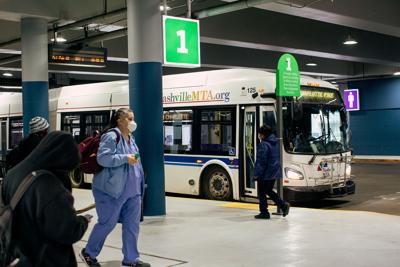Mayor Freddie O’Connell heard from his three transition committees — tasked with reports on transit, housing and city operations — just before Thanksgiving. After an hour of conversational presentations from committee heads, one audience question hit the mark.
The same question has dogged Nashville’s transit-focused mayor since the campaign trail: “When will the next transit referendum be on the ballot?”
Vanderbilt University Medical Center trauma surgeon Dr. Alex Jahangir, O’Connell’s pick to lead the eight-person committee on transit and transportation, was clear without being pushy.
“You need to present this to all Nashvillians in a high-turnout election,” Jahangir said. “And the most high-turnout elections are presidential elections. The committee would probably recommend November 2024, but I guess that’s a political decision.”
“We hope to have a couple of key hires in the very near future to respond to the recommendations of the [committee] report,” responded O’Connell. “We’ll start there, probably do the analysis they recommend, and make a decision very soon.”
Move quickly to make an “early determination” about a referendum, advises the committee. Get a plan, build a coalition and communicate its goals with eyes on November.
By this spring, Nashville would be almost halfway through the $8.9 billion in light rail and bus rapid transit improvements proposed by former Mayor Megan Barry in the city’s last transit referendum, “Let’s Move Nashville.” Instead, the proposal failed in a drubbing that New York-based think tank TransitCenter attributed to organized opposition from the Koch brothers network, a hastily planned product that lacked community buy-in, and Barry’s abrupt resignation in March 2018, two months before the referendum vote. The whole debacle was turned into a case study by TransitCenter, cutely titled, “Derailed: How Nashville’s Ambitious Transit Plan Crashed at the Polls — and What Other Cities Can Learn From It.” While the former mayor’s affair with her bodyguard, Metro police Sgt. Rob Forrest, may linger among gossips as her personal legacy, the overwhelming failure of Let’s Move casts a longer policy shadow over the city — a city that continues to suffer from anemic local and regional transportation options and increasing traffic congestion.
A mayor can tweak the edges of the city’s existing transit infrastructure with budget items and capital improvements. Overhauling the entire system with major service upgrades, new offers like light rail or regionally connected routes throughout the county would take much more money. A petition endorsed by 10 percent of registered voters in Davidson County could send any bond issuance approved by the Metro Council to a referendum. Any dedicated transit funding coming from state tax streams triggers a direct referendum. Overhauling Nashville transit likely hits on one or both of those scenarios.
First as a Metro Transportation Authority board member and then over eight years on the Metro Council, O’Connell built a reputation as a transit advocate. He often recalls the same anecdote — that getting rid of his car enabled him to save enough money for a downpayment on a home in Salemtown, a personal finance hack currently unimaginable for the average Nashvillian. Now as mayor, O’Connell has the blessing and burden of putting together the large-scale solutions he’s gestured toward for years.
During their six-week runoff, candidates O’Connell and Alice Rolli pledged to “pursue” a transit referendum, proof that the political calculus has determined the city is ready to move past 2018. The endorsement from fiscally conservative Rolli is a testament to the obvious need that Nashville must do something very big and very expensive to rework its transportation system. O’Connell emphasized that any plan must proceed deliberately and include community buy-in — his attempts to avoid repeating 2018.
Pressure to get a referendum on the ballot by Nov. 7 could run afoul of both those goals.
“Their recommendation of November 2024 is a tight turnaround,” says Alex Apple, O’Connell’s deputy communications director. “That doesn’t make it unfeasible. A transit referendum is in the cards, but the mayor doesn’t know when or what, or what needs a dedicated funding stream versus what can be included in the budget or what can be done legislatively. He’s not under the misconception that this can be done with the wave of a pen.”
O’Connell’s first moves have been meetings with the Greater Nashville Regional Council (a planning coalition of local governments in Middle Tennessee) and a trip to Orlando, Fla., for a public transit conference. Planners agree that Nashville’s transit picture has to include neighboring population centers across the region, something that can connect satellites like Mt. Juliet, Murfreesboro, Clarksville, Franklin and Columbia.
“My vision for five to 10 years would involve some form of multimodal connectivity for the entire region, including a mix of light rail, other incentives to reduce vehicles and increase higher occupancy travel, and combination of interstate and regional connector roadway improvements,” Columbia Mayor Chaz Molder tells the Scene. He says Columbia sends 10,000 daily commuters to Williamson and Davidson counties. “These discussions have been ongoing for years, and I look forward to continuing this conversation and watching this plan become a reality.”





